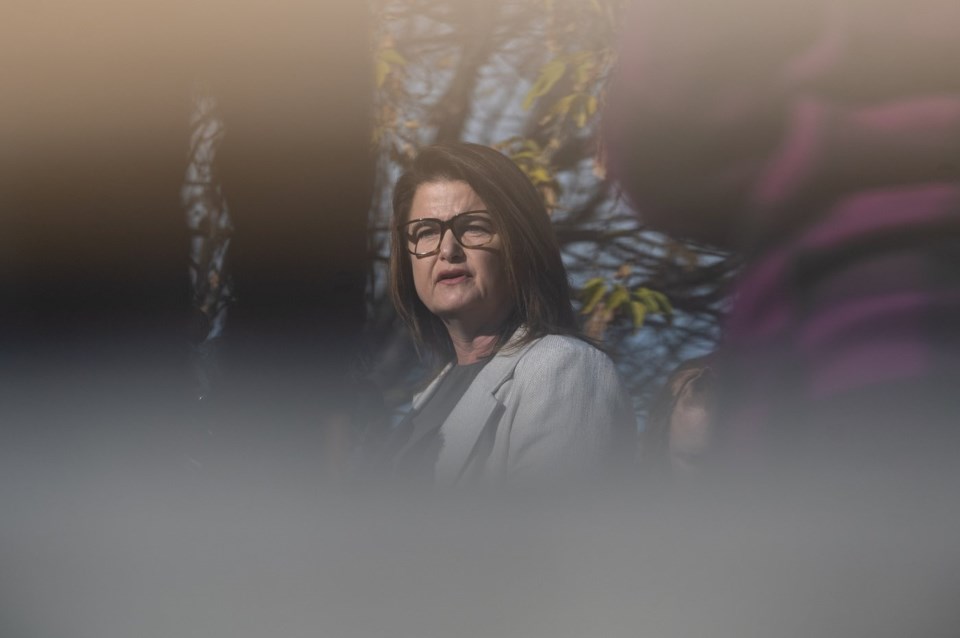REGINA — Saskatchewan New Democratic Leader Carla Beck was on the campaign trail Tuesday promising better health care, while the Saskatchewan Party's Scott Moe proposed to continue withholding federal carbon levy payments.
Beck told a news conference she would hire 800 health-care workers in areas that are the most in need if she becomes premier on Oct. 28.
She previously announced an NDP government would spend $1.1 billion on health care over four years, with much of those dollars for hiring and improving working conditions.
More than 4,000 professionals left the health-care field last year in Saskatchewan, the highest rate in any province, she said.
"This has led to emergency room closures, service blackouts and, in the most severe cases, instances of patients dying in our province before they get the care that they need," Beck said.
"This simply has to stop."
Beck made the commitment alongside Kayla Deics, a Regina woman recently diagnosed with Stage 3 breast cancer.
Deics said she had to go to Calgary to get a biopsy to confirm the cancer, as wait times were too long in Saskatchewan. She paid $2,000 out of pocket, she added.
"If I would have trusted the Saskatchewan health-care system and waited until 2025 for my original biopsy in Regina, I'll be frank in saying this, I wouldn't be alive to make that appointment," she said.
"This is not how health care should be."
Saskatchewan Party Leader Scott Moe has said he would broaden the health-care plan his government announced two years ago. He has said 1,400 recent nursing grads have been hired since then.
In a news release Tuesday, Moe also said he would continue withholding federal carbon levy payments to Ottawa on home heating.
Moe said by not remitting the levy, the average household would save $480 next year.
Earlier this year, the Saskatchewan government stopped paying the federal carbon charge on natural gas, after Prime Minister Justin Trudeau's Liberals exempted home-heating oil users, who are mainly in Atlantic saąúĽĘ´«Ă˝, from paying.
Moe called Trudeau's decision unfair, saying all forms of home heating should be exempt.
Ottawa and Saskatchewan later reached an agreement, with the federal government securing half of what was owed until the dispute could be resolved.
Beck said she would be prepared to withhold carbon levy payments but that the province should still secure an exemption.
"We need a different system that doesn't have a consumer-based carbon tax," she said.
"We haven't seen (Moe) get a better deal with the federal government."
Also Tuesday, an NDP candidate found himself in hot water for song lyrics released 10 years ago.
Phil Smith, a former musician and the candidate for Estevan-Big Muddy, sang songs containing expletives referring to women and their bodies. He also rapped about drugs and crime.
Smith apologized after the Saskatchewan Party quoted some of the lyrics in a news release, calling them "misogynistic."
"I said things in my 20s that I don’t believe now whatsoever," he said in a statement.
"I experienced a horrifying incident several years ago where a gun was pulled on me, and this made me realize I was on the wrong path and that I needed to change my life for the better."
Smith said he's committed to taking action to end gender-based discrimination.
Asked about the lyrics, Beck said she wasn't aware of them.
Instead, she took aim at criminal issues involving former Saskatchewan Party government members. One was ejected from government caucus last year for charges of procuring sex, which were stayed when he took an alternative measures program.
Another former government member still faces an assault by choking charge.
"Song lyrics are one thing," Beck said. "Getting caught up in a sex trafficking sting or having assault charges for choking and assault — those are another thing.
"If that's what (Moe) wants to focus on, he can fill his boots. But we're focused on the things that Saskatchewan people need."
Beck and Moe are scheduled to participate in a televised debate Wednesday.
This report by The Canadian Press was first published Oct. 15, 2024.
Jeremy Simes, The Canadian Press



